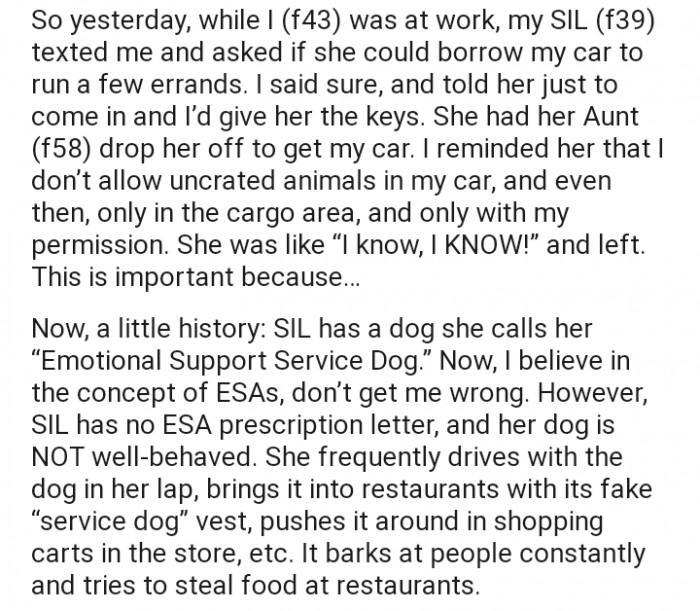Woman Asks SIL To Pay For Cleaning Out Her Car After She Brought Her Dog Inside Without Permission
Cars are one of the places people spend a lot of time in. They may take us around, but they serve other purposes than just that.
They keep us comfortable and warm on most days, not to mention that some of the most incredible music jamming sessions happen in them.
Many people are very particular about how they keep their cars. But, for real, many people don't joke with their babies.
We can't blame them, though. When you have a trusted partner to take you around, you do the needful to ensure it's always a comfy ride.
Some people even go as far as creating ground rules to ensure that even others who use their car know how to take care of it.
We found a story that paints a similar picture. One Redditor made a post under the AITA subreddit about an altercation with her SIL over her car.
OP (original poster) explained that she allowed her SIL to borrow her car to run a few errands. But on the condition that she avoids bringing in any uncrated animal inside.
Now the problem is OP's SIL has an "Emotional Support Service Dog" that she takes everywhere. And interestingly, she frequently drives with the cute critter on her lap.
So, you best believe that she wasn't going to use the car without letting her furry friend tag along. With the amount of dog hair and slobber OP found inside the vehicle, it was clear that the little guy was uncrated.
OP was furious and asked her SIL to pay for cleaning out the car. This didn't go down well with her SIL, who then accused her of being a "dog hater."
Now OP's husband and other members of their family have gotten involved. As things stand, it's not looking pretty.
Scroll down to find out how the rest of the story unfolds.
For more info: Reddit
Family feud - "No uncrated pets allowed!"



Exploring Boundaries and Permissions
The situation described in this article raises important questions about personal boundaries and consent, particularly when it comes to shared spaces and resources. Psychological research emphasizes that boundary violations can lead to feelings of resentment and betrayal. According to studies in the Journal of Applied Psychology, individuals who feel their boundaries have been disrespected often experience elevated stress and anxiety.
Understanding the psychological implications of these violations can help individuals navigate conflicts more effectively. Encouraging open discussions about boundaries can foster healthier relationships by ensuring all parties feel respected and valued.
The Dynamics of Conflict in Relationships
Conflict in relationships often reveals underlying issues that may not be immediately apparent. When someone feels their boundaries are violated, as in the case of the woman asking her sister-in-law to pay for cleaning the car, it can trigger a defensive response. According to Dr. John Gottman, a leading researcher on marital stability, these conflicts often stem from deeper emotional needs that remain unmet.
Gottman’s research emphasizes that understanding these needs is crucial in navigating conflicts and preventing escalation. When individuals feel disrespected or unheard, they may resort to extreme measures to assert their boundaries, leading to further conflict.
Exploring the Dynamics of Permission in Relationships
The incident involving the dog and the car illustrates the complexities of boundaries in relationships, particularly in family dynamics. A psychologist specializing in relational dynamics may suggest that the request for permission reflects deeper issues of trust and respect. Research has shown that clear boundaries are essential for healthy relationships, as they help establish mutual understanding and respect for personal space.
According to studies in the Journal of Family Psychology, individuals who navigate boundaries effectively tend to have more satisfying relationships. This incident raises questions about the implicit agreements we have with family members regarding personal property and responsibility.

Let's see how the Reddit community reacted to the story:
"NTA. Never, ever let her borrow your car again"

"It sounds like SIL is one of those people who fakes needing a service dog just to have her yappy little dog go with her everywhere"

Conflict resolution techniques highlight the importance of addressing misunderstandings before they escalate. Research shows that individuals who engage in proactive communication are better equipped to resolve disputes amicably. Techniques such as active listening and summarizing each other’s perspectives can create a collaborative environment, fostering mutual respect and understanding.
Involving a mediator or neutral third party can also facilitate discussions around boundary violations, providing a safe space for all involved. Studies indicate that mediation can lead to higher satisfaction levels in conflict resolution, as it allows individuals to express their feelings in a structured manner.
Moreover, the concept of boundary-setting in relationships is crucial for maintaining healthy dynamics. Research indicates that individuals who clearly communicate their boundaries are more likely to experience satisfying and respectful interactions. By addressing issues directly, individuals can prevent misunderstandings and foster a culture of mutual respect.
Using 'I' statements, such as 'I feel uncomfortable when...' can help express feelings without placing blame, making it easier for the other person to understand the impact of their behavior.
Furthermore, the reaction of the woman asking for payment for cleaning her car indicates a potential misunderstanding of relational roles. A clinical psychologist might note that such demands can signify deeper feelings of resentment or lack of appreciation within the relationship. Research indicates that when individuals feel their boundaries are violated, they may respond with anger or defensiveness, which can escalate conflicts.
Understanding these emotional responses is crucial in resolving disputes and fostering healthier communication. According to a study by Dr. John Gottman, effective conflict resolution strategies can lead to improved relational satisfaction and reduced hostility.
"She’s TA and so is your husband. Her erratic behavior will get worse if no one puts a halt to it"

"NTA Your car, your rules"

"Nta but sit your husband down and discuss that him letting his sister walk all over is wrong and using the excuse she is fragile is not okay"

Understanding Emotional Responses
Emotional responses to perceived boundary violations can be intense, often triggering feelings of anger or frustration. Research in emotional psychology indicates that these reactions are not just personal but can be rooted in past experiences of trauma or neglect. Understanding this context can help individuals navigate their feelings more effectively, allowing for healthier responses in the future.
Practicing self-reflection and recognizing triggers can empower individuals to respond thoughtfully rather than reactively. Techniques such as mindfulness and journaling can enhance emotional awareness and regulation, ultimately leading to better conflict resolution.
Emotional Responses to Boundary Violations
Boundary violations can evoke strong emotional responses, leading to feelings of anger, resentment, or betrayal. Studies in emotional psychology show that such reactions often stem from a perceived loss of control or respect. Developing emotional awareness can help individuals recognize these responses and address them constructively.
For example, practicing self-reflection and journaling can provide insights into emotional triggers, helping individuals process their feelings and develop healthier coping strategies.
The Importance of Communication in Resolving Conflicts
Communication plays a vital role in addressing misunderstandings related to boundaries. Studies show that individuals often assume their intentions are clear, leading to conflict when others interpret their actions differently. A communication expert might suggest that utilizing 'I' statements can help express feelings without placing blame, fostering a more constructive dialogue.
Research from the Journal of Social Psychology indicates that when individuals communicate their feelings and needs openly, it reduces defensiveness and promotes understanding. This approach can be particularly effective in family dynamics, where emotions run high.
"Never, EVER, loan your car again!!"

"Tell your husband that let his sister borrow his car then next time she needs one and let him know you will refuse to enter it if it is full of dog fur or smells like dog"

"If you buy her birthday or holiday presents, don't do so until you've gone through enough occasions that you would've spent the $150"

The role of empathy in resolving conflicts cannot be overstated. Studies show that when individuals practice empathy, they are more likely to understand the perspectives of others, reducing the likelihood of escalation. Empathy allows individuals to connect on a human level, fostering compassion and understanding.
By actively trying to see the situation from the other person's viewpoint, individuals can diffusing tensions and create a more collaborative environment. This approach often leads to more constructive discussions and outcomes.
Furthermore, engaging in open dialogue about emotions can help de-escalate conflicts. Research suggests that when individuals share their feelings in a safe environment, it can lead to greater understanding and empathy. This open communication can facilitate conflict resolution and strengthen relationships.
In terms of practical recommendations, individuals can benefit from engaging in open dialogues about expectations and boundaries before conflicts arise. Establishing these discussions can create a safer environment for expressing concerns and can help prevent misunderstandings. According to research on preemptive communication, discussing potential issues in advance can significantly reduce conflict occurrences.
By establishing a culture of open communication, family members can feel more comfortable addressing potential boundary violations without resorting to conflict.
"She agreed to your reasonable limit, she broke it, she has to pay"

"SIL has no respect for you, and feels entitled...The privilege is lost, and you can’t trust her. That’s her consequence"

Update: OP's husband has decided to pay instead. In addition, she's setting some strict boundaries.
UPDATE

Practical Steps for Navigating Boundary Issues
To effectively address boundary issues, individuals can adopt specific communication strategies. Research supports the use of 'I' statements as a powerful tool for expressing personal feelings without assigning blame. This technique fosters a more open dialogue and minimizes defensiveness, making it easier to resolve conflicts.
Additionally, setting clear expectations regarding shared spaces can prevent misunderstandings. Regular check-ins and discussions about boundaries can ensure that all parties feel comfortable and respected, ultimately enhancing the relationship.
The Impact of Perception on Conflict Resolution
Perception plays a significant role in how conflicts are experienced and resolved. According to social psychology, individuals often interpret situations based on their past experiences and biases, which can cloud judgment. Recognizing these biases is essential for effective communication and conflict resolution.
For instance, if one party perceives the other as intentionally disrespectful, it can escalate the conflict. By reframing the situation and considering the other person's perspective, individuals can foster a more compassionate dialogue.
Emotional Triggers and Their Impact on Relationships
The emotional reactions that arise from boundary violations often stem from past experiences. Dr. Laura Berman, a renowned sex therapist, states, "Unresolved emotional wounds from childhood can significantly impact adult relationships, leading to heightened responses to perceived threats." Understanding these triggers is essential for promoting emotional intelligence and healthier relationship dynamics. According to Dr. Terri Orbuch, a relationship researcher, "Individuals who work on recognizing their emotional triggers are better equipped to respond thoughtfully rather than react impulsively." This self-awareness can lead to improved relationship satisfaction, as highlighted on her professional website terriorbuch.com.
As essential as it is to keep the interior of cars clean, some people can't help bringing in their furry friends. It's understandable tho—we can't resist either.
However, when the car belongs to someone else, the situation changes. The Reddit community is firmly in support of the "Your car, your rules" theory.
Do you think OP is a "dog hater," as her SIL claimed, or was she right in her demands? Don't hesitate to share your thoughts in the comments section!
Lastly, encouraging empathy within family dynamics can greatly enhance understanding and conflict resolution. Empathy involves not only understanding another's perspective but also validating their feelings. Research from the Journal of Personality and Social Psychology indicates that individuals who practice empathy tend to have more positive interactions and healthier relationships.
By cultivating an environment of empathy, family members can navigate conflicts more gracefully, leading to stronger bonds and mutual respect.
Psychological Analysis
When examining the dynamics of this situation, it's evident that boundary issues often lead to misunderstandings and conflict. Individuals may feel their personal space is violated, prompting defensive reactions. By addressing these feelings openly and fostering constructive communication, families can navigate these challenges more effectively.
Analysis generated by AI
Analysis & Alternative Approaches
In conclusion, the situation surrounding the disagreement over the dog and the car illustrates the complexity of boundaries in familial relationships. Research supports the idea that effective communication and empathy are key ingredients in resolving such conflicts. By fostering these skills, individuals can build stronger, more respectful relationships.
Additionally, understanding the role of empathy in conflict resolution can facilitate healthier interactions. Empathy allows individuals to connect on a deeper level and understand each other's experiences. Research indicates that cultivating empathy can reduce conflict and enhance relationship satisfaction.
Strategies for Effective Conflict Management
Effective conflict management strategies are essential for maintaining healthy relationships. Techniques such as active listening, validation, and compromise can help individuals navigate disagreements more effectively. Research in conflict resolution emphasizes the importance of finding common ground and negotiating solutions that respect both parties' needs.
For instance, suggesting a compromise, such as sharing the cleaning costs, can demonstrate a willingness to collaborate and resolve the issue amicably, fostering goodwill in the relationship.
In conclusion, understanding the dynamics of conflict can empower individuals to navigate disagreements with greater ease. By fostering open communication, emotional awareness, and empathy, individuals can transform conflicts into opportunities for growth and connection. Ultimately, these skills can lead to healthier, more fulfilling relationships.
Analysis & Alternative Approaches
In summary, addressing conflicts with a psychological perspective can lead to more constructive outcomes. According to research in emotional psychology, recognizing and addressing emotional triggers can facilitate healthier interactions. By developing effective communication strategies, individuals can foster more respectful and understanding relationships.
Analysis & Alternative Approaches
Understanding the psychological dynamics of boundary violations can significantly improve interpersonal relationships. Research consistently shows that clear communication, empathy, and proactive boundary setting are essential in navigating conflicts. By prioritizing these elements, individuals can foster healthier, more respectful relationships.



